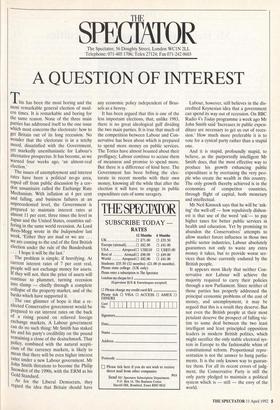SPECTAT T OR
The Spectator, 56 Doughty Street, London WC1N 2LL Telephone: 071-405 1706; Telex 27124; Fax 071-242 0603
A QUESTION OF INTEREST
This has been the most boring and the most remarkable general election of mod- ern times. It is remarkable and boring for the same reason. None of the three main parties has addressed itself to the one issue Which most concerns the electorate: how to get Britain out of its long recession. No wonder that the electorate is in a tetchy mood, dissatisfied with the Government, yet markedly unenthusiastic for Labour's alternative prospectus. It has become, as we warned four weeks ago, 'an almost-real election.'
The issues of unemployment and interest rates have been a political no-go area, roped off from public discussion by a cor- don unsanitaire called the Exchange Rate Mechanism. With inflation at 4 per cent and falling, and business failures at an unprecedented level, the Government is prepared to maintain interest rates at almost 11 per cent, three times the level in Japan and the United States, countries suf- fering in the same world recession. As Lord
Rees-Mogg wrote in the Independent last week, `Either they are mad or we are . . . we are coming to the end of the first British election under the rule of the Bundesbank
• • . I hope it will be the last.' The problem is simple, if horrifying. At current interest rates of 7 per cent real, People will not exchange money for assets. If they will not, then the price of assets will continue to plummet, turning recession into slump — chiefly through a complete collapse of the property market, and of the banks which have supported it. The one glimmer of hope is that a re- elected Conservative government would be prepared to cut interest rates on the back of a rising pound on relieved foreign exchange markets. A Labour government can do no such thing: Mr Smith has staked his and his party's credibility on the pound remaining a clone of the deutschmark. That Policy, combined with the natural scepti- cism of the currency markets, is likely to mean that there will be even higher interest
rates under a new Labour government. Mr John Smith threatens to become the Philip Snowden of the 1990s, with the ERM as his Gold Standard.
As for the Liberal Democrats, they regard the idea that Britain shmild have any economic policy independent of Brus- sels as a heresy.
It has been argued that this is one of the less important elections, that, unlike 1983, there is no great ideological gulf dividing the two main parties. It is true that much of the competition between Labour and Con- servative has been about which is prepared to spend more money on public services. The Tories have almost boasted about their profligacy; Labour continue to accuse them of meanness and promise to spend more. But there is a difference of kind here. The Government has been bribing the elec- torate in recent months with their own money, knowing all the while that after the election it will have to engage in public expenditure cuts of some savagery. Labour, however, still believes in the dis- credited Keynesian idea that a government can spend its way out of recession. On BBC
Radio 4's Today programme a week ago Mr John Smith said 'Increases in public expen-
diture are necessary to get us out of reces- sion.' How much more preferable it is to vote for a cynical party rather than a stupid one.
And it is stupid, profoundly stupid, to believe, as the purportedly intelligent Mr
Smith does, that the most effective way to
produce his growth enhancing public expenditure is by overtaxing the very peo- ple who create the wealth in this country. The only growth thereby achieved is in the economies of competitor countries, through flight of capital, both monetary and intellectual.
Mr Neil Kinnock says that he will be `ask- ing' the well-off — how repulsively dishon- est is that use of the word 'ask'— to pay higher taxes for better public services in health and education. Yet by promising to abandon the Conservatives' attempts to allow market forces influence in those two public sector industries, Labour absolutely guarantees not only to waste any extra money it takes, but to provide worse ser- vices than those currently endured by the British people.
It appears most likely that neither Con- servative nor Labour will achieve the majority required to carry their policies through a new Parliament. Since neither of those parties has properly addressed the principal economic problems of the cost of money, and unemployment, it may be argued that this is a result they deserve. But not even the British people at their most petulant deserve the prospect of falling vic- tim to some deal between the two least intelligent and least principled opposition leaders in modern British politics, which might sacrifice the only stable electoral sys- tem in Europe to the fashionable whim of constitutional reform. Proportional repre- sentation is not the answer to hung parlia- ments. It is the only known way to guaran- tee them. For all its recent errors of judg- ment, the Conservative Party is still the only party pledged to maintain a political system which is — still — the envy of the world.


















































 Previous page
Previous page